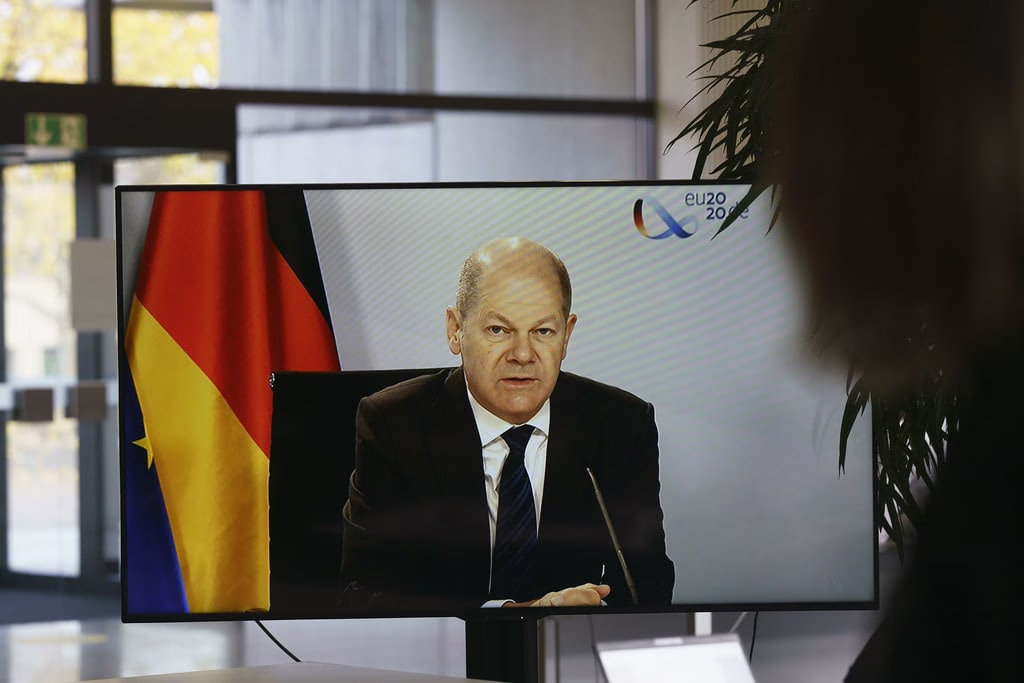As Russia’s unprovoked onslaught in Ukraine grinds on, it’s time for Bundeskanzler Olaf Scholz to step up and give Kyiv everything it needs to protect its citizens. There’s no time like the present: Ukraine’s recent moves in the Kursk region—using German equipment—mark a significant but limited success. More to the point, they demonstrate that the Ukrainians can win, but that they need Western support to reach the finish line.
I grew up in the Soviet Union, where, two decades before my birth, the Nazis killed millions of people. Generations of German leaders have vowed to keep that specter at bay. Vladimir Putin’s Russia is the most tangible manifestation of the fascist menace in Europe since 1945. Yet today, Scholz’s government is actually planning to slash its aid to Ukraine in half and freeze any new requests for aid for the remainder of the year—just as the Ukrainians are beginning to reclaim the initiative.
Instead of waiting for massed Russian troops to cross the border and no doubt attack more hospitals, schools, and shopping malls, Ukraine took the fight to them with an incursion into the Kursk region, often using equipment provided by Germany and other free nations. The Bundestag’s Defense Committee has approved the use of German weapons in the campaign. That’s good news, and it underscores the importance of Western support in Ukraine’s success. But Kyiv could be on the backfoot again soon if Scholz’s cuts go forward and German assistance to Ukraine dries up.
It’s not too late for Germany to change course. Today, my organization, the Renew Democracy Initiative, is launching a petition with a clear message: Scholz shouldn’t just reverse his planned reduction in aid—he should increase Germany’s assistance to Ukraine. And he must give Ukraine the long-range systems it needs to stop Russian aggression at the source. This includes the coveted Taurus missile, which could take out the Kerch Bridge linking occupied Crimea with mainland Russia, decisively crippling the invaders’ supply lines and potentially shifting the tide of the war.
Doing so would be the ultimate fulfillment of Germany’s historic duty. As the Ukrainian human rights champion Oleksandra Matvichuk observed in an appeal to the United Nations last year, “the link between peace and human rights is inextricable […] every state which systematically disregards human rights poses a threat to everyone within and outside of its territory.” The defenders of freedom and democracy need to be armed with more than just platitudes when the agents of autocracy are bringing tanks, rockets, and jets to the fight.
Supporting Ukraine also makes Germans and all Europeans safer. Putin threatens not only his immediate neighbors, but the democratic order on the entire continent. Some in Germany are keenly aware of this reality. German Defense Minister Boris Pistorius recently remarked that the country should be ready for war within five years. “We must not believe Putin will stop at Ukraine’s borders,” Pistorius cautioned. He’s right on that point. But instead of building up its own military (risking domestic political upheaval) while waiting for this outcome, Germany can prevent this threat from ever arising by acting decisively to support Ukraine now with weapons that would otherwise collect dust in Bundeswehr warehouses. The West stood aside as Russia invaded Georgia and annexed Crimea. If Moscow is allowed to swallow up all of Ukraine, then the frontlines will not be in Kharkiv and Kherson, but in Vilnius, Warsaw, and perhaps even Berlin.
And for as much as Putin’s military adventures are evidence that he is a deadly threat, his tepid response when the West actually helps Ukrainians defend themselves shows that he can be stopped. Putin doesn’t escalate when we fight back, he escalates when we appease him. Moscow threatened “military and political consequences” if Finland and Sweden joined NATO. After their membership was already a done deal, Putin changed tack: actually, he had “no problems” with these countries’ accession to the alliance. Last May, Russia’s president spoke of “enormous risks” for Kyiv’s allies should they supply Ukraine with F-16s. Now, the American-made fighter jet is being integrated into the Ukrainian Air Force, and Putin appears no closer to unleashing World War III on NATO than he was two years ago.
Put simply, Putin is far more likely to march on Germany because Western leaders open the door for him in Ukraine than if Berlin accepts its leadership responsibility and stands up to the Russian dictator today. Like successive modern German leaders before him, Olaf Scholz has repeatedly intoned about the burden of his country’s past in shaping its present. On the war in Ukraine, he affirmed last month: “In view of our own history, there can only be one place for Germany in this situation: at Ukraine’s side.” Ukraine has only asked Germany to live up to that commitment in its appeals for life-saving military assistance. Nevertheless, when Kyiv sought Taurus missiles—a battlefield-altering variable that could prevent future bloodshed—Scholz coldly dismissed the request as “irresponsible.” In fact, the only one bucking their responsibility is the German chancellor himself.


